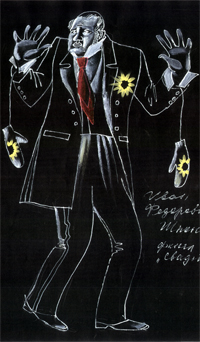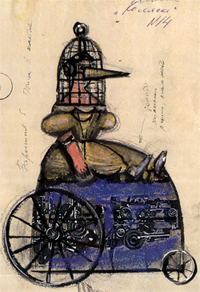Running time: 2 hours 55 minutes
The performance has two intervals
World premiere: 1 April 2009, Mariinsky Theatre, St Petersburg
| The Lawsuit Musical Director: Valery Gergiev
|
The Lawsuit is a magnificent example of Gogol´s style: with vivid characters and an absurdist and, at the same time, realistic plot development. As in most of Gogol´s satirical works, here there are no positive characters. Foolishness, envy, tight-fistedness and cynicism – these are the principal traits of the protagonists. |
SYNOPSIS OF THE OPERA THE LAWSUIT The senate chief secretary Prolyotov is overcome with envy of his more successful fraternity of fellow staff and superiors. He feels particular dejection and despondency when he learns from the newspapers of the successes of Pavel Petrovich Burdyukov, his old acquaintance. In his dreams, he unmasks the bribe-taker and scoundrel, stripping him of his rank and titles and even sending him to penal servitude. Unexpectedly Prolyotov hears the footman speak the odious name: Burdyukov is waiting in the antechamber. He is dumbfounded. It turns out that Khristophor Burdyukov, Pavel Petrovich s younger brother, has come to Petersburg in the hopes of commencing a lawsuit against his relative regarding the inheritance. The chief secretary is delighted to have the opportunity to spoil things for Burdyukov senior – something of which he has only been able to dream. Khristophor Petrovich complains to Prolyotov that his brother compiled the will himself and deceitfully forced his aunt to sign it. The aggrieved younger brother is only left with a pile of old rags. Events of the recent past become known through the inconsistent tale of a beggar. Khristophor Burdyukov comes to see his failing aunt and finds her on her deathbed. The elder brother has established himself as master in his relation s house and declares that the will and testament have been compiled and signed by the old woman. As soon as the old woman dies the will is read out and Burdyukov junior discovers that he has been left with nothing. A real battle brews over the corpse of the dead woman. Khristophor Petrovich resolves to be off to the capital for justice, whither senate chief secretary Prolyotov is also headed for assistance. Burdyukov junior indignantly points out an obvious absurdity in the will to his newly-appointed protector: instead of a signature there is the incongruous little word “fraudsters”. Prolyotov is satisfied: now he has come up trumps. Left alone, Prolyotov gives free reign to his Schadenfreude. The thought that Burdyukov senior s treachery will be discovered brings him indescribable pleasure. |
 | Shponka and His Aunt Musical Director: Valery Gergiev
|
Shponka… is my first major effort in the opera genre. Work progressed very quickly. In three months I had written all the basic material. The ease of writing was a result of the extremely high-quality libretto by Arkady Zastyrets. Initially it was terrifying to take a non-poetic text, but during the composition process I came to understand the full delight of working with prose. |
SYNOPSIS OF THE OPERA SHPONKA AND HIS AUNT Arriving at his aunt´s, it turns out that she is in wonderful physical form and deceitfully chose merely to lure her nephew to deal with some paperwork that involves Grigory Storchenko. Finding out that Shponka has met him on the road, she sends Ivan Fyodorovich to the house of this irrepressible man, her loathsome neighbour. Arriving at Storchenko´s, Shponka immediately attacks a generous lunch. At table, he becomes familiar with Grigory Grigorievich´s two sisters – Brunette and Fair-Haired. Returning to his aunt´s, Shponka meets her on her way back from a hunt and they start a talk from which the aunt learns that at lunch at Storchenko´s Ivan has fallen for the fair-haired maid. Instantly a plan begins to form in her mind: to marry her nephew off, and at the same time solve her problems. The aunt and Shponka set off for the Storchenkos. At Storchenko´s house, the aunt arranges for Ivan Fyodorovich to be left alone with Fair-Haired. But, a man utterly at sea in affairs of the heart, the abashed Shponka is completely unable to carry an inappropriate talk about flies. On the way home in the britzka, the aunt tries to convince her nephew of the need to marry. For Shponka these words come as a prison sentence. Once alone, he has a glass of vodka and falls asleep, suffering from thoughts of marriage. These thoughts and events of a mad day do not abandon him even in his slumber. His aunt, Storchenko and his two sisters appear before Shponka in wedding dresses, and each of them proves: “It is I who am your wife!” The visions encourage Shponka and decisively call on him to wake up and marry. |
 | The Carriage Musical Director: Valery Gergiev
|
The Carriage is a one-act comic opera based on the story of the same name by Nikolai Gogol. The basis of the recitative fragments comes from Gogol´s original text. |
SYNOPSIS OF THE OPERA THE CARRIAGE The guests sit down to play whist. During the game they drink champagne. Chertokutsky stands up to leave, but each time he returns to the table. Suddenly the game is at an end. Chertokutsky stands up with difficulty – the champagne has done its job. The officers have to assist him into his carriage. On the way home, the landowner even manages to fall face first into a patch of burdock. Chertokutsky´s young wife awakes and delights in the beautiful morning and her own reflection in the mirror. The Chertokutskys´ serfs are taking care of all sorts of every-morning pastoral intermedia in order to sweeten their mistress´ temper. Suddenly the mistress of the house sees guests approaching. She rushes to waken her husband. She succeeds in rousing him with great difficulty. It transpires that the master and mistress are far from ready to receive guests. And how! Chertokutsky had returned at four in the morning without even thinking of giving orders for lunch. From fear and shame he hides in the barn. The General and the officers approach the coach house. A house-serf, following his master´s orders, says that there is no-one at home. The guests are disappointed. In order that the visit is not in vain, the General suggests he and the others take a look at the carriage without the master of the house. He finds the coach to be most ordinary indeed, yet nonetheless decides to look inside – just in case there is something special there. And his expectations are justified, although in a most peculiar way: he discovers the master of the house inside. |


The highlighting of performances by age represents recommendations.
This highlighting is being used in accordance with Federal Law N436-FZ dated 29 December 2010 (edition dated 1 May 2019) "On the protection of children from information that may be harmful to their health"



